
Illustration: Xia Qing/Global Times
Lithuania's foreign minister Gabrielius Landsbergis has urged other nations to follow his country's lead and withdraw from the "17+1" cooperation platform between China and Central and Eastern European Countries (CEEC), Nikkei Asia reported Tuesday. Landsbergis has just concluded a visit to Japan, with Lithuania seeking increased engagement with countries that endorse the US Indo-Pacific strategy. Lithuania may expect its anti-China rhetoric to become a stepping stone to the Asia-Pacific trade bloc, but we believe the CEEC will not be willing to play along and act as cannon fodder in Lithuania's attempt to flatter the US.Lithuania, a small country with a population of less than 3 million, quitted the "17+1" cooperation platform in May 2021, several weeks after the nation announced it would open a trade representative office in China's Taiwan to promote its relations with the island. As it is such a small country the move had little economic significance, but it seems Lithuania wants to flatter Washington and impress US politicians.
As the US has focused on forming a "values alliance" against China, Lithuania decided to repeat this little trick again. A report by the SCMP said Tuesday that some European lawmakers are pushing to designate alleged "human rights abuses" in China's Xinjiang as "genocide." As conflicts in China-EU ties caused by differing ideologies have increased, Lithuania may think it has been given another chance to persuade EU members to quit the "17+1" cooperation platform and stand on the opposite side from China. Over the past few months, Lithuania's exports to many Asia-Pacific countries have seen varying degrees of increase, so it hopes to flatter the US, with the "17+1" platform to be used as a card against China.
However, Landsbergis' efforts to urge other CEEC members to abandon the platform will not influence China's cooperation with those countries. It's just a childish act for such a small country to try to involve itself in great power competition.
The economic growth of many countries in the Eastern European region is mainly driven by exports. In the midst of a global pandemic that brought many European economies to a halt, some economists have urged the countries to diversify their export markets given the insufficient demand in their traditional European markets. China is the best option for these Eastern European countries as they try to shore up exports.
Bilateral trade between China and the CEEC grew at an average annual rate of 8 percent from 2012-20, more than twice the rate of China's trade growth with the EU. China and the CEEC can see huge potential for future cooperation. Some economists estimate that China will import $170 billion worth of goods from the CEEC in the 2021-25 period.
Also, projects under the China-proposed Belt and Road Initiative (BRI) are proceeding as scheduled despite the COVID-19 pandemic, and the infrastructure buildup is attracting more investment into the CEEC and providing jobs for local communities. The BRI has significantly brought down transportation costs. Most of the goods traded between Western Europe, Eastern Europe and China are transported by road, while the use of railways is increasing, so there will be a decline in transportation costs. Infrastructure construction will benefit not only the CEEC but also Western Europe.
However, there is no denying that some European nations have complex feelings about the BRI and the "17+1" initiative. The US may further step up its political maneuvers to pit Europe against China, giving a chance for countries like Lithuania to act as pawns. However, the actions of individual countries will not derail long-standing pragmatic cooperation between China and the CEEC. Landsbergis' efforts to urge the CEEC to abandon the "17+1" cooperation mechanism are doomed to fail.
The author is a reporter with the Global Times. bizopinion@globaltimes.com.cn



